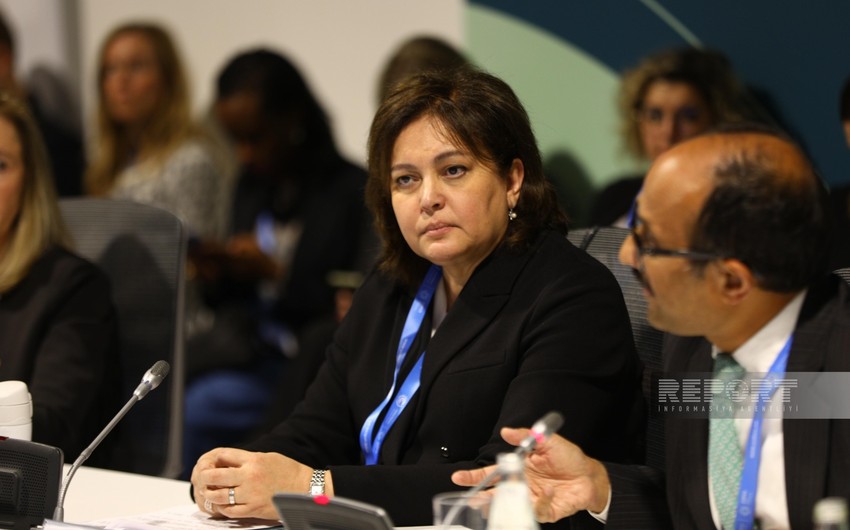During the COP29 event "Strengthening Climate Information Services and Multi-Hazard Early Warning Systems for Increased Resilience," Deputy Minister of Ecology and Natural Resources, Umayra Taghiyeva, highlighted Azerbaijan's commitment to developing effective Early Warning Systems (EWS) as a crucial adaptation measure against climate change.
According to Report, she emphasized the importance of collaboration among various stakeholders, including governments, international organizations, the private sector, and local communities, in creating successful EWS.
"I would like specially to note the leadership of WMO, United Nations Office for Disaster Risk Reduction, United Nations Environmental Program, International Telecommunication Union, IFRC on scaling up early warning and early action," she said, adding that universal EWS will allow to protect communities from hazards and increase resilience.
"It is no coincidence that since the beginning of COP29 there have already been conducted several high-level events dedicated to EWS," she said.
According to her, COP29 Presidency amplified international messages on the EW4All in its 3 initiatives which are open to everyone. These includes multi-sectoral Actions Pathways (MAP) to Resilient and Healthy Cities initiative, Baku Dialogue on Water for Climate Action initiative and Green Digital Action initiative.
"The world is already experiencing changes in average temperature, shifts in the seasons, an increasing frequency of extreme weather events, and slow onset events. Countries and communities need to develop EWS as adaptation solutions and implement actions to respond to current and future climate change impacts. Successful creation of EWS not only depends on governments, but also on the active and sustained engagement of stakeholders, including local communities, national, regional, multilateral and international organizations, public and private sectors, civil society and other relevant actors, as well as an effective management of knowledge," Tahiyeva said.
She noted that the EWS prossess should be based on and guided by the best available science and technologies. Under the Paris Agreement, the Global Goal on Adaptation was established.
"Following the conclusion of a 2-year work programme, at cop28, Parties adopted the UAE Framework for Global Climate Resilience, as part of the UAE Consensus.The framework includes a range of targets for climate adaptation and resilience and provides a platform for increased implementation of adaptation actions such as EWS on the ground," the deputy minister said.
She noted that Azerbaijan faced an unprecedented number of floods in recent years, with 147 cases in the previous year and 109 cases already recorded this year.
The deputy minister said the country has also experienced an increase in the frequency and duration of heat waves, as noted in the latest IPCC reports.
"And now I want to share with you an example of how you can mitigate possible consequences by acting. Joint research, development of a methodology and coordinated work of the Institute of Geography, the Ministry of Health and the Ministry of Ecology served as the basis for the release of a new type of product, namely medico -meteorological forecasts and warnings. These forecasts were prepared for both weather-sensitive people suffering from cardiovascular diseases and the population as a whole," she said.
She noted that during the hot period, early warning of the onset of heat waves made it possible to significantly reduce the number of ambulance calls with a diagnosis of heat and sunstroke.
"Despite the fact that the number of hot days is growing, the number of ambulance calls has significantly decreased compared to the period before informing the population. Climate change is an irreversible process. Therefore, it is important to develop EWS," Taghiyeva said.
She noted that, according to the WMO, the damage from disaster can be reduced by 30% if an early warning is issued within 24 hours.
"Our target is to create EWS up to 2027 as effective adaptation measure. Significant action are taken by Government to invest in to modernization of monitoring system, which is first pillar for EW. I would like to take this opportunity to thank Finland and Turkiye for their technical and methodological support to this process," she said.
The deputy minister noted that today many countries lack multi-hazard early warning systems, climate resilience measures and local disaster preparedness plans.
"EWS must be available to everyone, including LDCs and SIDS," she said.
According to Taghiyeva, to address all these gaps, in 2019 Azerbaijan with support of UNEP submitted project concept to the Green Climate Fund “Strengthening Climate Information and Multi-Hazard Early Warning Systems for Increased Resilience in Azerbaijan." The document was approved in October of this year.
"We aim to provide an opportunity for our neighbouring countries to collaborate and benefit from project implementation as it will serve regional perspectives on addressing climate change risks," she said.


